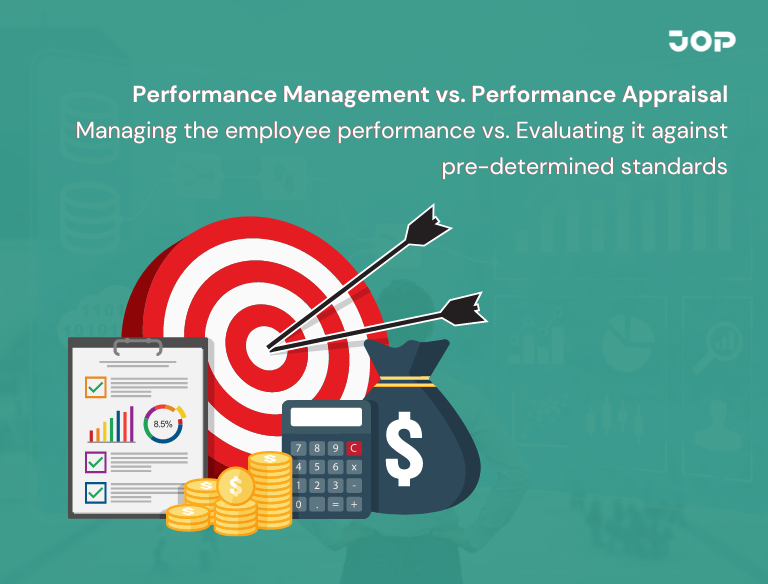Do you think performance management VS performance appraisal are the same? It’s a common confusion in many workplaces. People often use these terms interchangeably, but the truth is, they’re not the same.
Old annual performance reviews are dead; continuous performance management is the future.
That’s why we have compiled this blog to clear the fog. We’ll break down the distinctions between performance management and performance appraisal in plain, simple language. No jargon, no head-scratching – just straightforward insights to help you grasp the concepts.

Difference between performance management and performance appraisal
Performance management Software is the continuous process of improving performance by setting individual and team goals that are aligned with the strategic goals of the organization.
It involves establishing clear expectations, monitoring progress, providing feedback, and developing the skills and abilities of employees to achieve organizational goals. It is a continuous cycle of planning, monitoring, reviewing, and improving individual and team performance.
A performance appraisal is a systematic and periodic process of measuring an individual’s work performance against the established requirements of the job. It is subjective evaluation of the employee’s strengths and weaknesses, relative worth to the organization, and future development potential. This process is often facilitated by a performance management solution.
Performance appraisals are also called performance evaluations, performance reviews, development discussions, or employee appraisals. The appraisal aims to help each employee succeed by providing performance feedback, identifying improvement areas, and supporting professional development.
Performance Management vs Performance Appraisal
| Performance Management | Performance Appraisal |
Continuous process It’s like having ongoing chats with your manager and a supportive coach by your side. |
Periodic process It’s your annual sit-down with your boss where you review your year’s work. |
Focuses on ongoing feedback and development It’s like your ongoing coach, giving you feedback and helping you grow. |
Focuses on evaluating past performance It’s sort of like a report card for your past performance and looking back in evaluation. |
| Involves setting goals and objectives It’s like a GPS that helps you succeed. It sets objectives and shows you the way to follow. |
Involves assessing performance against predetermined standards It’s like reaching your destination and checking whether you’ve arrived as expected. |
| Emphasizes employee engagement and development It’s like a coach cheering you on, helping you improve and grow. |
Emphasizes employee evaluation and rating It’s more like a judge giving you a score based on what you’ve done in the past. |
| Provides real-time feedback It’s like having a chat with your team member whenever they need a little nudge or applause. |
Provides feedback at specific intervals It’s like the annual report card; it’s when you sit down once a year for a formal evaluation chat. |
| Focuses on improving performance It’s like coaching a sports team to win by improving their skills continuously. |
Focuses on measuring performance It’s like keeping score and evaluating their past performance. |
| Involves regular check-ins and communication It’s like having those regular check-ins where you discuss your projects, challenges, and plans. It’s about staying connected. |
Involves infrequent communication You meet team members once a year, and by the time you do, you’ve almost forgotten what you talked about last time |
| Proactive process It is the one who plans their vacation well in advance, booking hotels and activities. It’s proactive; you’re in control. |
Reactive process It’s a bit like being the last-minute traveler who scrambles to find a hotel at the destination. It’s reactive and sometimes stressful. |
| Comprehensive approach to managing performance It is similar to a performance buffet – skills development, goal setting, career growth – it’s a comprehensive feast! |
Narrow approach to managing performance It’s focused on that one annual evaluation and doesn’t cover the whole menu. |
| Continuous improvement process It’s like a workout routine. You’re hitting the gym regularly, tweaking exercises, and seeing gradual improvements. It’s a continuous journey. |
A one-time evaluation process It’s like getting an annual health checkup – you go in once, get `your results, and that’s it for the year. Not much room for real-time adjustments. |
Collaborative process between managers and employees It’s like a tag team where managers and employees team up to set goals, give feedback, and make performance rock. |
A top-down process It can feel like a solo act where managers just dish out grades without much say from employees. |
| Flexible and multi-dimensional process It’s super adaptable, like changing colors to fit the situation. It looks at performance from all angles and isn’t just about numbers. |
Rigid and one-dimensional process It’s more like a strict teacher. It usually sticks to a set list of criteria and ratings. |
| Focuses on the future It’s all about the future. It’s like looking ahead, setting goals, and helping employees grow. |
Focuses on the past It likes to hang out in the past. It’s mainly about looking back at what’s already happened and giving it a grade. |
| Holistic approach to managing performance It takes the holistic route. It’s like looking at the big picture, from setting expectations to coaching and development. |
Limited approach to managing performance It is a bit more narrow and often boils down to a once-a-year review of past performance without considering the whole journey. |
| Strategic process It’s like the big picture strategy and ensuring everyone’s on the same page and moving in the right direction. It’s like steering the ship towards the long-term goals of the company |
Tactical process That’s more like the day-to-day stuff. It’s about looking at what’s happening right now. Making quick adjustments and tweaking the sails on that ship to keep it on course in the short term. |

Gaurav Sabharwal
CEO of JOP
Gaurav is the CEO of JOP (Joy of Performing), an OKR and high-performance enabling platform. With almost two decades of experience in building businesses, he knows what it takes to enable high performance within a team and engage them in the business. He supports organizations globally by becoming their growth partner and helping them build high-performing teams by tackling issues like lack of focus, unclear goals, unaligned teams, lack of funding, no continuous improvement framework, etc. He is a Certified OKR Coach and loves to share helpful resources and address common organizational challenges to help drive team performance. Read More
 Gaurav Sabharwal
Gaurav Sabharwal
